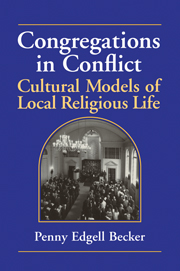Book contents
- Frontmatter
- Contents
- Tables
- Acknowledgments
- 1 “Who We Are” and “How We Do Things Here”: Local Understandings of Mission and Identity
- 2 The Congregations of Oak Park, River Forest, and Forest Park
- 3 Houses of Worship
- 4 Family Congregations
- 5 Community Congregations
- 6 Leader Congregations
- 7 Mixed Congregations
- 8 An Institutional Approach to Local Culture
- 9 American Congregational Religion
- Appendix A Data and Methods
- Appendix B The Interview Questions
- References
- Index
8 - An Institutional Approach to Local Culture
Published online by Cambridge University Press: 07 August 2009
- Frontmatter
- Contents
- Tables
- Acknowledgments
- 1 “Who We Are” and “How We Do Things Here”: Local Understandings of Mission and Identity
- 2 The Congregations of Oak Park, River Forest, and Forest Park
- 3 Houses of Worship
- 4 Family Congregations
- 5 Community Congregations
- 6 Leader Congregations
- 7 Mixed Congregations
- 8 An Institutional Approach to Local Culture
- 9 American Congregational Religion
- Appendix A Data and Methods
- Appendix B The Interview Questions
- References
- Index
Summary
I began this study seeking a better way of understanding conflict by seeing it as an entire pattern of interactions by people who are committed to an ongoing relationship with each other in a specific face-to-face context (cf. Becker et al. 1993). Cultural factors were built in from the start as both outcomes (what issues are fought over) and predictors (liberal versus conservative cultural orientation). But an explicit, comparative approach to understanding the relationship between local culture and conflict came out of changes that were made during the course of fieldwork. I progressed from thinking about discrete conflict outcomes being determined by a uniform set of underlying variables to understanding the variation in basic types of congregation that shape, and are shaped by, conflict and other aspects of group process. As was discussed in Chapters 1 and 2, this change was prompted by an interaction between the fieldwork and an evolving consideration of methods; of the relationship between conflict and other features of group life, including moral expectations for action; and of the structure of authority and commitment.
Often the process of reassessment is kept “backstage” and receives little attention in the final published account of the research, which is generally written as though the analysis proceeded in a straightforward and uninterrupted way from the initial formation of the research problem and research design.
- Type
- Chapter
- Information
- Congregations in ConflictCultural Models of Local Religious Life, pp. 172 - 205Publisher: Cambridge University PressPrint publication year: 1999



